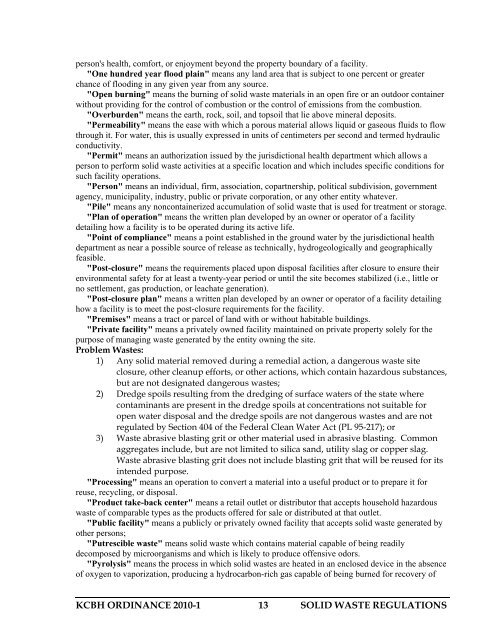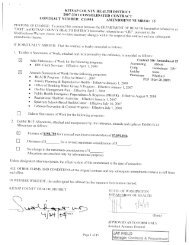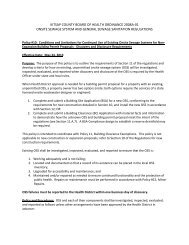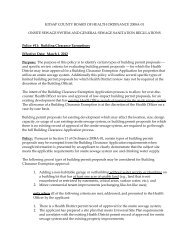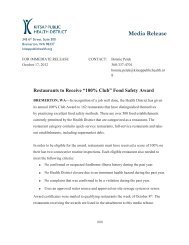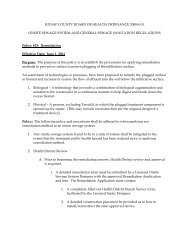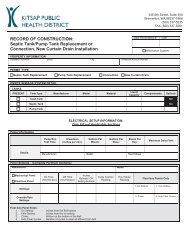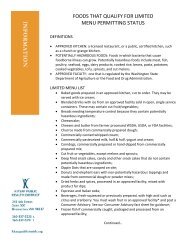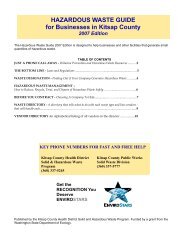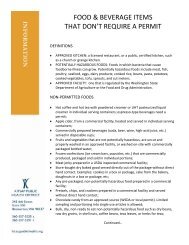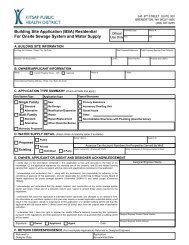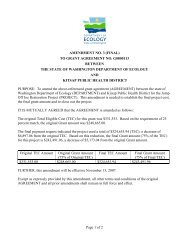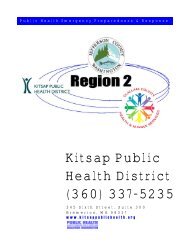SOLID WASTE REGULATIONS - Kitsap Public Health District
SOLID WASTE REGULATIONS - Kitsap Public Health District
SOLID WASTE REGULATIONS - Kitsap Public Health District
You also want an ePaper? Increase the reach of your titles
YUMPU automatically turns print PDFs into web optimized ePapers that Google loves.
person's health, comfort, or enjoyment beyond the property boundary of a facility.<br />
"One hundred year flood plain" means any land area that is subject to one percent or greater<br />
chance of flooding in any given year from any source.<br />
"Open burning" means the burning of solid waste materials in an open fire or an outdoor container<br />
without providing for the control of combustion or the control of emissions from the combustion.<br />
"Overburden" means the earth, rock, soil, and topsoil that lie above mineral deposits.<br />
"Permeability" means the ease with which a porous material allows liquid or gaseous fluids to flow<br />
through it. For water, this is usually expressed in units of centimeters per second and termed hydraulic<br />
conductivity.<br />
"Permit" means an authorization issued by the jurisdictional health department which allows a<br />
person to perform solid waste activities at a specific location and which includes specific conditions for<br />
such facility operations.<br />
"Person" means an individual, firm, association, copartnership, political subdivision, government<br />
agency, municipality, industry, public or private corporation, or any other entity whatever.<br />
"Pile" means any noncontainerized accumulation of solid waste that is used for treatment or storage.<br />
"Plan of operation" means the written plan developed by an owner or operator of a facility<br />
detailing how a facility is to be operated during its active life.<br />
"Point of compliance" means a point established in the ground water by the jurisdictional health<br />
department as near a possible source of release as technically, hydrogeologically and geographically<br />
feasible.<br />
"Post-closure" means the requirements placed upon disposal facilities after closure to ensure their<br />
environmental safety for at least a twenty-year period or until the site becomes stabilized (i.e., little or<br />
no settlement, gas production, or leachate generation).<br />
"Post-closure plan" means a written plan developed by an owner or operator of a facility detailing<br />
how a facility is to meet the post-closure requirements for the facility.<br />
"Premises" means a tract or parcel of land with or without habitable buildings.<br />
"Private facility" means a privately owned facility maintained on private property solely for the<br />
purpose of managing waste generated by the entity owning the site.<br />
Problem Wastes:<br />
1) Any solid material removed during a remedial action, a dangerous waste site<br />
closure, other cleanup efforts, or other actions, which contain hazardous substances,<br />
but are not designated dangerous wastes;<br />
2) Dredge spoils resulting from the dredging of surface waters of the state where<br />
contaminants are present in the dredge spoils at concentrations not suitable for<br />
open water disposal and the dredge spoils are not dangerous wastes and are not<br />
regulated by Section 404 of the Federal Clean Water Act (PL 95-217); or<br />
3) Waste abrasive blasting grit or other material used in abrasive blasting. Common<br />
aggregates include, but are not limited to silica sand, utility slag or copper slag.<br />
Waste abrasive blasting grit does not include blasting grit that will be reused for its<br />
intended purpose.<br />
"Processing" means an operation to convert a material into a useful product or to prepare it for<br />
reuse, recycling, or disposal.<br />
"Product take-back center" means a retail outlet or distributor that accepts household hazardous<br />
waste of comparable types as the products offered for sale or distributed at that outlet.<br />
"<strong>Public</strong> facility" means a publicly or privately owned facility that accepts solid waste generated by<br />
other persons;<br />
"Putrescible waste" means solid waste which contains material capable of being readily<br />
decomposed by microorganisms and which is likely to produce offensive odors.<br />
"Pyrolysis" means the process in which solid wastes are heated in an enclosed device in the absence<br />
of oxygen to vaporization, producing a hydrocarbon-rich gas capable of being burned for recovery of<br />
KCBH ORDINANCE 2010-1 13 <strong>SOLID</strong> <strong>WASTE</strong> <strong>REGULATIONS</strong>


